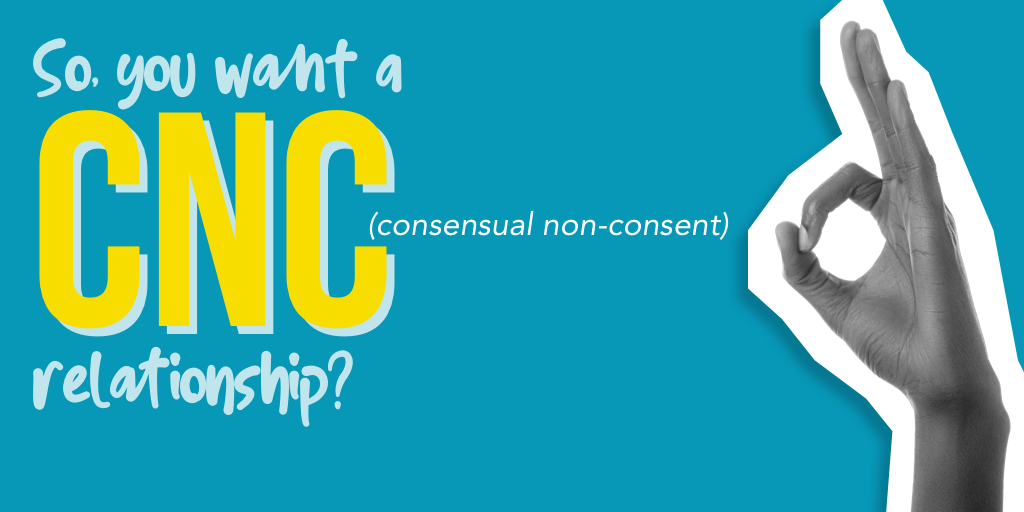Or maybe you just want a relationship where your partner is there to help push you beyond your limits, expand your comfort zone, and share experiences with you that you would never choose for yourself, but that you would love to have, with the right person…
AWESOME!
I 100% support your desire.
And I’d love to give you some suggestions for getting it right.
Because to me, there are a lot of ways of getting it wrong, and getting CNC (consensual non-consent) wrong can be at best a really fucked up situation, and at worst pretty serious abuse and harm.
And we don’t want that.
So, I’m going to share what I know about CNC, from talking to people who have lived happily in CNC relationships for 5+ years.
1. Start with consent.
Not just average consent, which is often not really consent much at all, but actual, mindful consent.
When getting to know each other, from the first contact, practice consent. A “No” is always honored until the situations in which it is not honored are negotiated.
More, consent is acquired for all play and all stages of play—especially sexual play and more intense parts of kink. It’s about getting to know each other.
2. Discussions are had about HOW boundaries might be pushed, when consent might be ignored, and why.
These are usually done during the AAR (After Action Report). (https://datingkinky.com/blog/lifestyle-thoughts/the-aar-after-action-report/)
Consensual play happens as usual, and after, there is a discussion about opportunities for more intense pushing and CNC.
3. Values and limits are discussed from BOTH sides.
A big part of CNC is developing the trust that you both ultimately want the same sorts of things from your kink and personal lives.
This is where the whole “Well, would you let your Master chop off a leg?” types of questions are answered with, “If Master decided to chop off my leg, it would be because they decided it was necessary, and I would trust them, because I know who they are as a person.”
It seems a bit ridiculous from the outside. It’s a level of trust that has been developed and made a part of their lives.
4. The top/D-Type/Master/McDomlyPants pays attention.
This is key. A HUGE key.
At every stage of the relationship, the Ultimate Authority is aware of their charge’s needs and desires.
That doesn’t mean that they cater to them.
But that they are aware.
In the book, “Pragmatic Thinking and Learning,” one of the main takeaways for me was “Use rules for novices, intuition for experts.”
It cites studies done that show that while experts can set and create rules for novices to follow that will greatly enhance the performance of a novice, were the experts to actually follow their own rules to the letter, their productivity would drop drastically.
The point I’m making here is that those who successfully create and maintain a long term CNC relationship know the rules of consent, deeply understand their bottom, and use their experience to guide them in when breaking those “rules” works best to get the feelings they as a couple wish to experience.
And they never stop paying attention, digging/mining for more information, learning new ways to create experiences and feelings.
They endeavor to embody the word “master” in all of it’s meanings.
5. There is space set aside to “step out” of the relationship dynamics for frank talk and feedback.
Not all of the successful relationships I spoke to had this.
All but one did, in some form.
A way to even the playing field, to engage as humans about feelings and needs, and how things are going (more of the AAR, for example).
And in all of the other CNC relationships that do this, it was insisted upon by the Ultimate Authority as part of How We Do This™.
Don’t start without laying the foundation.
I do believe there are people out there who start without laying the foundation, and who make it work.
(If you are in a couple like this, please do speak up!)
However, as I like to say, it’s possible, not probable.
I’ve engaged with more than 50, possibly over a hundred people who rushed a CNC relationship and found deep trauma and harm as a result over the long run.
They didn’t develop the connection and understanding that allowed the relationship to grow safely into that realm.
And interestingly, many might assume that only the s-type or bottom might be harmed in this. They would be wrong. Many D-types are also harmed. They do what they have been given the authority to do, and find deep guilt and even sometimes feelings of betrayal when it doesn’t work out. Or are even accused of things that they never saw coming.
In the end, if you want a relationship where you have agreed that certain things can or should be pushed past—those relationships are best developed carefully, with consent, until you leave that consent behind.
Because otherwise, pushing past a no too early, even if good things come of the push, can ultimately create harm from not accepting the “No.”
What are your thoughts?
CNC – yes, no, maybe? Why or why not? Do you have experience with it that you can share?
And do you have any additional thoughts/suggestions on what makes CNC work? Or what is likely (in your experience) to make it fail?








